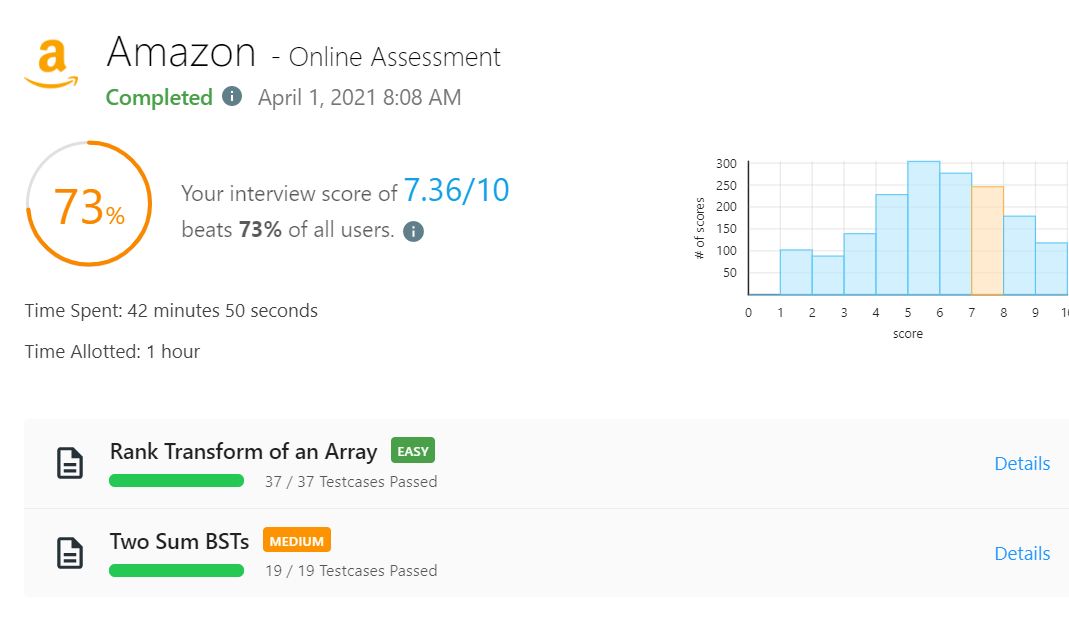
Rank Trees
class Solution {
public int[] arrayRankTransform(int[] arr) {
if (arr.length < 1) return new int[0];
Map<Integer, Integer> m = new HashMap<Integer, Integer>();
int[] sorted = arr.clone();
Arrays.sort(sorted);
int rank = 1;
int prev = sorted[0];
m.put(prev, rank);
for (int i = 1; i < sorted.length; i++) {
if (! m.containsKey(sorted[i])) {
rank++;
m.put(sorted[i], rank);
}
}
int[] result = new int[arr.length];
for (int j = 0; j < arr.length; j++) {
result[j] = m.get(arr[j]);
}
return result;
}
}Runtime: 22 ms, faster than 92.03% of Java online submissions for Rank Transform of an Array.
Memory Usage: 55.9 MB, less than 44.18% of Java online submissions for Rank Transform of an Array.
제 사랑 쉬맵이...rg?^^
Two Sum BSTs
/**
* Definition for a binary tree node.
* public class TreeNode {
* int val;
* TreeNode left;
* TreeNode right;
* TreeNode() {}
* TreeNode(int val) { this.val = val; }
* TreeNode(int val, TreeNode left, TreeNode right) {
* this.val = val;
* this.left = left;
* this.right = right;
* }
* }
*/
class Solution {
public boolean twoSumBSTs(TreeNode root1, TreeNode root2, int target) {
if (root1 == null || root2 == null) return false;
TreeNode cur = root1;
ArrayList<Integer> list = new ArrayList<Integer>();
exploreAll(root1, list);
for (int i = 0; i < list.size(); i++) {
if (contains(root2, target - list.get(i))) {
return true;
} else {
continue;
}
}
return false;
}
private void exploreAll(TreeNode root, ArrayList<Integer> list) {
if (root == null) {
return;
}
list.add(root.val);
if (root.left != null) {
exploreAll(root.left, list);
}
if (root.right != null) {
exploreAll(root.right, list);
}
}
private boolean contains(TreeNode root, int target) {
int val = root.val;
while (root != null) {
if (root.val == target) {
return true;
}
if (root.val < target) {
contains(root.right, target);
} else {
contains(root.left, target);
}
}
return false;
}
}Time Limit Exceeded
처음엔 재귀를 2번 돌렸다가.... 이건 아니다 아차^^ 했죠
/**
* Definition for a binary tree node.
* public class TreeNode {
* int val;
* TreeNode left;
* TreeNode right;
* TreeNode() {}
* TreeNode(int val) { this.val = val; }
* TreeNode(int val, TreeNode left, TreeNode right) {
* this.val = val;
* this.left = left;
* this.right = right;
* }
* }
*/
class Solution {
private Set<Integer> list1 = new HashSet<Integer>();
private ArrayList<Integer> list2 = new ArrayList<Integer>();
public boolean twoSumBSTs(TreeNode root1, TreeNode root2, int target) {
if (root1 == null || root2 == null) return false;
TreeNode cur = root1;
exploreAll(root1);
exploreAll2(root2);
for (int i = 0; i < list2.size(); i++) {
if (list1.contains(target - list2.get(i))) {
return true;
}
}
return false;
}
private void exploreAll(TreeNode root) {
if (root == null) {
return;
}
exploreAll(root.left);
list1.add(root.val);
exploreAll(root.right);
}
private void exploreAll2(TreeNode root) {
if (root == null) {
return;
}
exploreAll2(root.left);
list2.add(root.val);
exploreAll2(root.right);
}
}Runtime: 3 ms, faster than 57.56% of Java online submissions for Two Sum BSTs.
Memory Usage: 39.8 MB, less than 56.79% of Java online submissions for Two Sum BSTs.
inorder로 root1과 root2를 정렬해주고 하나는 쉬셋이, 하나는 arraylist에 넣어줘서 arraylist를 탐구하면서 쉬셋이에 영혼의 짝꿍이 있는지 찾아줬읍니다
